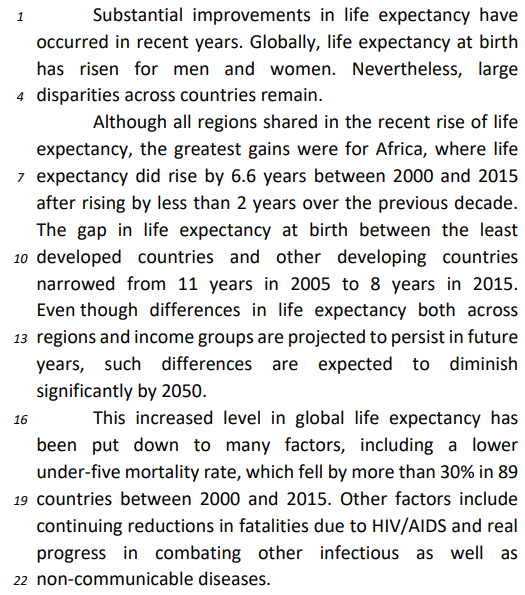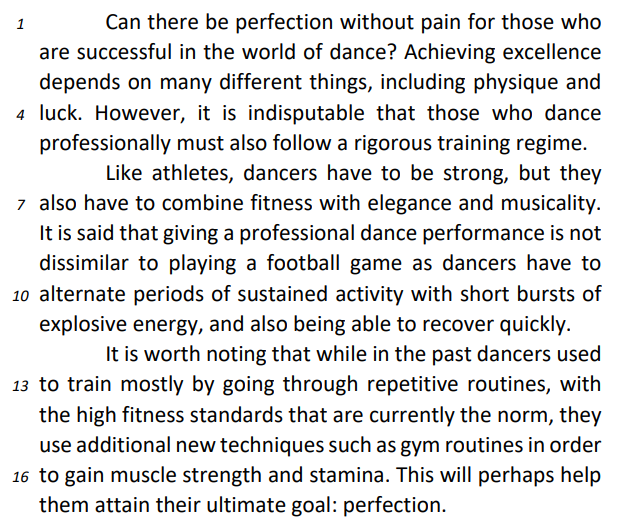Questões de Concurso
Comentadas sobre verbos | verbs em inglês
Foram encontradas 1.428 questões
Choose the verb form that best completes the following conditional sentence:
They would be able to know what is happening all over the world if ...
Choose the verb form to complete the sentence.
Read the text to answer the question.
Five Things to Know About Brazil’s New President, Michel Temer
(Ian Bremmer. Sept 1, 2016.)
Dilma Rousseff, Brazil’s first female president, was thrown out of office by the country’s senate on Wednesday following after an impeachment trial that ended the leftist Workers’ Party 13 years in power. She has been replaced by her former vice president and coalition partner Michel Temer of the centrist Democratic Movement party (PMDB). Temer has been running Brazil since Rousseff’s suspension in May, and is set to continue as president until the next election in 2018. Here are five things we know about the 75-year-old:
1. He is “nearly the opposite” of Rousseff
Temer, who has been elected to Congress four times, is “nearly the opposite” of Rousseff in terms of his political views and experience, according to The Economist. The magazine described him as a multitalented politician; a charming, elegant and conciliatory man who believes in a “blend of economic and social liberalism that is unusual in Brazil”. An example of this is his belief that abortion should be legal, which is at odds with the view of most of Brazil, which has some of the toughest abortion laws in the world.
2. But like Rousseff, he has been accused of corruption
Temer is not free from scandal; he’s currently being investigated for receiving an illicit $400,000 campaign donation in 2012 from the state oil company Petrobras. This has implicated him in the country’s biggest ever corruption scandal, known as “Operation Car Wash”, which has led to the jailing of dozens of executives and politicians and contributed to Brazil’s worst recession in decades.
3. He is pretty unpopular in Brazil
A poll in April by Brazil’s Folha de S. Paulo newspaper found that 60% of respondents supported Rousseff’s ouster, and 58% wanted to get rid of Temer too, USA Today reports. His unpopularity is partly to do with his implication in Operation Car Wash, but it hasn’t been helped by his controversial decision to create a cabinet made up solely of white men in a country where 53% of citizens are mixed race and 52% are female.
4. His wife is a 33-year-old former beauty queen
Temer’s wife of 13 years, Marcela Temer, is former Miss São Paulo and more than 40 years his junior. She has been criticized by media outlets for her ‘Marie Antoinette’ spending during times of Brazil’s economic uncertainty, with MailOnline reporting that she has a nanny, a cook and two maids, as well as her mother and sister, to help her look after her only son, Michelzinho, who is seven. She recently appeared on the cover of the conservative magazine Veja where she was described as “Beautiful, demure and homely”.
5. He is a keen poet, to the amusement of some Brazilians
Temer is the author of a book of poems, titled Anonymous Intimacy, as well as a textbook on constitutional law. According to the New York Times, the president began writing poetry when he found himself jotting his thoughts on cocktail napkins in airport lounges when working as a lawmaker a few years ago. He has mused on the themes of letter-writing in the text-messaging era, lust and radicalism – the latter being a one line poem that simply read “No. Never again!” Temer’s poetry has not been particularly well received in Brazil and there is even a Twitter account with over 33,000 followers that frequently mocks the president’s creative expressions.
(Available: http://time.com/tag/brazil/page2.)
“Physiological studies have found that speaking two or more languages is a great asset to the cognitive process.”
Take into consideration the rules for employing the present perfect tense, then choose the following alternative in which this tense is CORRECTLY used.
Brain Development: Can Teaching Make a
Difference?
It has long been known that different regions of the brain have specialized functions. For example, the frontal lobes are involved in abstract reasoning and planning, while the posterior lobes are involved in vision. Until recently, it was believed that these specialized regions developed from a genetic blueprint that determined the structure and function of specific areas of the brain. That is, particular areas of the brain were designed for processing certain kinds of information from birth.
New evidence suggests that the brain is much more malleable than previously thought. Recent findings indicate that the specialized functions of specific regions of the brain are not fixed at birth but are shaped by experience and learning. To use a computer analogy, we now think that the young brain is like a computer with incredibly sophisticated hardwiring, but no software. The software of the brain, like the software of desktop computers, harnesses the exceptional processing capacity of the brain in the service of specialized functions, like vision, smell, and language. All individuals have to acquire or develop their own software in order to harness the processing power of the brain with which they are born.
A number of studies support this view. However, all were carried out on animals, because it is not possible to do such research with humans. Caution is called for when extrapolating these findings to humans.
These findings may have implications for language educators: for one thing, that teaching and teachers can make a difference in brain development, and that they shouldn’t give up on older language learners.
Source: http://carla.umn.edu/immersion/acie/vol5/Nov2001_
BrainResearch.html (Edited.)
Read this sentence from the text and analyze its structure:
These findings may have implications for language educators: for one thing, that teaching and teachers can make a difference in brain development, and that they shouldn’t give up on older language learners.
The core modal verbs in English are “can”, “could”, “may”, “might”, “shall”, “should”, “will”, “would”, and “must”. Their use obeys some syntactic restrictions. Which of the following alternatives presents an incorrect example of the use of a modal verb?
Brain Development: Can Teaching Make a
Difference?
It has long been known that different regions of the brain have specialized functions. For example, the frontal lobes are involved in abstract reasoning and planning, while the posterior lobes are involved in vision. Until recently, it was believed that these specialized regions developed from a genetic blueprint that determined the structure and function of specific areas of the brain. That is, particular areas of the brain were designed for processing certain kinds of information from birth.
New evidence suggests that the brain is much more malleable than previously thought. Recent findings indicate that the specialized functions of specific regions of the brain are not fixed at birth but are shaped by experience and learning. To use a computer analogy, we now think that the young brain is like a computer with incredibly sophisticated hardwiring, but no software. The software of the brain, like the software of desktop computers, harnesses the exceptional processing capacity of the brain in the service of specialized functions, like vision, smell, and language. All individuals have to acquire or develop their own software in order to harness the processing power of the brain with which they are born.
A number of studies support this view. However, all were carried out on animals, because it is not possible to do such research with humans. Caution is called for when extrapolating these findings to humans.
These findings may have implications for language educators: for one thing, that teaching and teachers can make a difference in brain development, and that they shouldn’t give up on older language learners.
Source: http://carla.umn.edu/immersion/acie/vol5/Nov2001_
BrainResearch.html (Edited.)
Read this sentence from the text and analyze its structure:
It has long been known that different regions of the brain
have specialized functions.
The verb “to have” can be used as a main verb as well as an auxiliary verb in English. Which of the following alternatives doesn’t present a characteristic of the verb “to have”?
What is Monica going to do?
Text for the item.
A long and healthy life?

Internet: <www.ngllife.com> (adapted).
Based on the text, judge the following item.
The modal auxiliary would can be used instead of “could” in “A baby born today could live” (line 1) without affecting the meaning of the sentence.
Text for the question.
Higher life expectancy worldwide

Text for the question.
Higher life expectancy worldwide

Text for the question.
The route to perfection

Text for the question.
The route to perfection

Text for the question.
The route to perfection

TEXT 1
School for sexism
By Deborah Cameron (Oxford University)
This week, it was announced that schools in England are being issued with new guidelines on combatting sexism and gender stereotyping. This initiative follows research conducted for the Institute of Physics (IoP), which found that most schools took sexism less seriously than other kinds of prejudice and discrimination. […]
The IoP’s main concern—one it shares with the government, which co-funded the research—is that girls are being deterred from studying science subjects by the sexist attitudes they encounter in school. Language is only one of the issues the report urges schools to tackle. […] But language was the main theme picked up in media reporting on the new guidelines, with many news outlets dramatically proclaiming that children ‘as young as five’ were going to be ‘banned’ from using certain words.
[…] I think we can guess why these newspapers were so keen on the language angle. They’ve known since the heyday of ‘political correctness gone mad’ that nothing stirs up the wrath of Middle England like a story about someone trying to ban words. Never mind that no sane parent permits total free expression for the under-fives […].
This reporting only underlined the point that sexism isn’t taken as seriously as other forms of prejudice. […] Rather than being outraged by the idea of telling primary school children to watch their words, shouldn’t we be asking why ‘children as young as five’ are using sexist language in the first place?
We may not want to think that this is happening among children still at primary school, but unfortunately the evidence says it is. […] Girl Guiding UK publishes an annual survey of girls’ attitudes: the 2015 survey, conducted with a sample of nearly 1600 girls and young women aged between 7 and 21, found that in the week before they were questioned, over 80% of respondents had experienced or witnessed some form of sexism, much of which was perpetrated by boys of their own age, and some of which undoubtedly occurred in school. 39% of respondents had been subjected to demeaning comments on their appearance, and 58% had heard comments or jokes belittling women and girls. […]
By the time they go to secondary school, girls are conscious of this everyday sexism as a factor which restricts their freedom, affecting where they feel they can go, what they feel able to wear and how much they are willing to talk in front of boys. In the Girl Guiding UK survey, a quarter of respondents aged 11-16 reported that they avoided speaking in lessons because of their fear of attracting sexist comments.
So, the Institute of Physics isn’t just being perverse when it identifies sexist ‘banter’ as a problem that affects girls’ education. It’s to the organization’s credit that it’s saying this shouldn’t be tolerated—and it’s also to its credit that it’s offering practical advice. Its recommendations are sensible, and its report contains many good ideas for teachers to consider. […]
When the Sunday Times talks about ‘boys and girls cheerfully baiting each other in the playground’, the implication is that we’re dealing with something reciprocal, a ‘battle of the sexes’ in which the two sides are evenly matched. But they’re not evenly matched. What can a girl say to a boy that will make him feel like a commodity, a piece of meat? What popular catchphrase can she fling at him that has the same dismissive force as ‘make me a sandwich’? […]
The IoP report does not seem to grasp that there is more to sexism than gender stereotyping. It falls back on the liberal argument that stereotyping harms both sexes equally: it’s as bad for the boy who wants to be a ballet dancer as it is for the girl who dreams of becoming an astrophysicist. But sexism doesn’t harm boys and girls equally, just as racism doesn’t harm white people and people of colour equally. It is the ideology of a system based on structural sexual inequality: male dominance and female subordination. You can’t address the problem of gender stereotyping effectively if you don’t acknowledge the larger power structure it is part of.
Disponível em: https://debuk.wordpress.com. Acesso em: 20 out. 2019.
Choose the right answer to the question:
How old is Kate now?